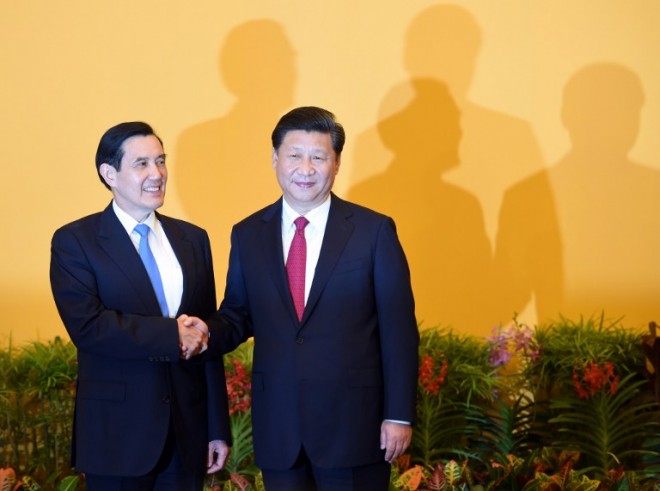Chinese media warns Taiwan on independence after meet

Chinese President Xi Jinping (R) shakes hands with Taiwan President Ma Ying-jeou before their meeting at Shangri-la hotel in Singapore on November 7, 2015. The leaders of China and Taiwan hold a historic summit that will put a once unthinkable presidential seal on warming ties between the former Cold War rivals. AFP PHOTO / Roslan RAHMAN
Chinese state media warned Taiwan against pursuing independence Sunday, a day after a historic meeting between the leaders of the mainland and the island it calls its own.
President Xi Jinping and Ma Ying-jeou’s handshake in Singapore was a symbolic step towards closing the rift that has separated Beijing and Taipei since the end of the Chinese civil war in 1949.
READ: China, Taiwan leaders join hands at historic summit
But the occasion has also highlighted the tensions that remain across the Taiwan strait, where China still has an estimated 1,500 missiles aimed at stopping the island from declaring its independence.
Relations have improved dramatically since Ma’s 2008 election, with increases in trade and tourism, as well as the start of direct flights.
Article continues after this advertisementBut Beijing has grown concerned about the relationship’s future as Taiwan’s opposition Democratic Progressive Party (DPP), which has long called for a split with the mainland, looks set to win January’s presidential election, potentially unseating Ma’s friendly Kuomintang party (KMT).
Article continues after this advertisementThe People’s Daily, the official mouthpiece of the ruling Communist Party, warned against “Taiwan independence” in a Sunday morning editorial, saying that Taiwan must respect the “1992 consensus”, a tacit agreement which acknowledges there is “one China” but allows each side their own interpretation.
Without adhering to the principle, it said, “the boat of peaceful development may meet with raging waves and stormy seas.”
“It might even capsize,” it said.
Stern admonitions also appeared in the often fiery Global Times, which has close ties to the communist leadership.
“Taiwan society lacks vigilance, and Taiwan has failed to impose restrictions on its potential destructive force to the island’s future”, the paper said.
The island, it warned, “must urge candidates that only by adhering to the 1992 Consensus can they fulfil their obligations of guaranteeing a lasting peace for the island’s 23 million people, and therefore be qualified as a ‘president.'”
Ma, too, has warned against the consequences of diverging from the 1992 consensus, which the DPP does not recognize.
DPP presidential candidate Tsai Ing-wen has repeatedly said that she will maintain the status quo if elected president in January, but is likely to face pressure from pro-independent voices within her own party.